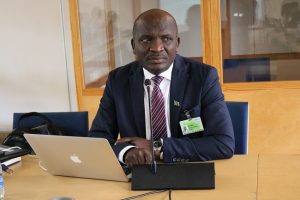The African Group of Negotiators on Climate Change (AGN) says the just released Global Stocktake (GST) Factual Synthesis Report shields away from addressing some key elements in the right context and in line with the overall objective of the GST.

Speaking during the launch of the GST technical report, AGN Chair, Ephraim Mwepya Shitima, said whereas issues related to urgency, opportunities and efforts needed for keeping the 1.5 temperature goal of the Paris Agreement within reach were fairly covered, other key and fundamental issues raised by the African Group had not been adequately reflected or not captured in a manner that underscores their importance.
“For instance, the right to sustainable development, just transitions, equitable multiple pathways, and fairness are important principles and considerations that unlock needed ambition in developing countries. But the report shields away from addressing them in the right context and in line with the overall objective of the GST,” said Shitima.
“The point the African Group repeatedly made about the importance of safeguarding the policy space for developing countries recording the lowest progress towards achieving Sustainable Development Goals (SDGs) and the provision of means of implementation and a just transitioning to low emission and resilient development pathways consistent with Article 2 was also not effectively captured,” he noted.
Additionally, the AGN Chair pointed out that the report also shields away from effectively reflecting the principle of differentiation, obligations, adequate and predictable provision of finance for enhancing adaptation, and that reforms of the financial architecture could have been better elaborated to include clear recommendations that many Parties including the African Group had put forward.
“We look forward to discussing the implications of the findings of the technical assessment phase in the next and final phase of GST-1 in an objective and constructive manner to ensure that it serves its purpose and motivates parties and international cooperation to demonstrate progression and enhance climate action and support towards achieving the purpose and global goals of the Paris Agreement,” concluded Shitima in his submission.
The synthesis report of the technical dialogue of the GST, which was published on September 8, 2023, summarises 17 key technical findings from the discussions. Across the topics, the report makes clear that there is progress, but much more needs to be done. While there are well-known gaps, the technical findings highlight existing and emerging opportunities and creative solutions to bridge the gaps.
The GST was designed under the Paris Agreement to assess global response to the climate crisis and chart a better way forward. The global stocktake is held every five years and is intended to inform the next round of Nationally Determined Contributions (NDCs) to be put forward by 2025.
The process started with a data collection phase in 2021, collecting a wide range of inputs from Parties, international bodies, and non-Party stakeholders. A technical dialogue was carried out across three meetings in 2022 and 2023 and was chaired, with the assistance of the UN Climate Change secretariat, by two co-facilitators Farhan Akhtar and Harald Winkler, nominated by developed and developing countries respectively.
The scope of technical discussion was very broad, including mitigation, adaptation and support, as well as loss and damage and response measures. Cutting across all these topics were ambition and equity – all informed by best available science.
“The technical dialogues were based on the best available science, drawing on the latest findings of the Intergovernmental Panel on Climate Change (IPCC) and other sources of knowledge, with broad participation of experts and non-Party Stakeholders with diverse backgrounds. Across the discussions it was clear that the Paris Agreement has inspired widespread action that has significantly reduced forecasts of future warming. This global stocktake is taking place at a crucial moment to inspire further global action in responding to the climate crisis,” said Akhtar.
The report lays a strong scientific and technical base for the conclusion of the first GST in Dubai, in the United Arab Emirates, at the UN Climate Change Conference (COP28).
“This global stocktake report provides clear direction on how we can meet the expectations of the Paris Agreement by taking decisive action in this critical decade,” said COP28 President-Designate, Dr. Sultan Al Jaber. “To keep 1.5 within reach we must act with ‘ambition and urgency’ to reduce emissions by 43% by 2030. That is why the COP28 Presidency has put forward an ambitious action agenda centred around fast- tracking a just and well managed energy transition that leaves no one behind, fixing climate finance, focusing on people’s lives and livelihoods, and underpinning everything with full inclusivity.”
Simon Stiell, Executive Secretary of UN Climate Change, said: “I urge governments to carefully study the findings of the report and ultimately understand what it means for them and the ambitious action they must take next. It’s the same for businesses, communities and other key stakeholders. While the catalytic role of the Paris Agreement and the multilateral process will remain vital in the coming years, the global stocktake is a critical moment for greater ambition and accelerating action.”
Meanwhile, COP27 Representative, Ambassador Wael Aboulmagd, emphasised the importance of finance for developing countries to make progress on the noted gaps.
“All reliable available evidence points to gaps,” he said. “Finance for developing countries is critical. It is insidious to believe that we can make progress without the requisite financial resources; we thus insist that developing countries must be supported with the required finance to make progress. COP27 presidency is ready to work with all partners to deliver a successful outcome of the GST process.”
By Friday Phiri
